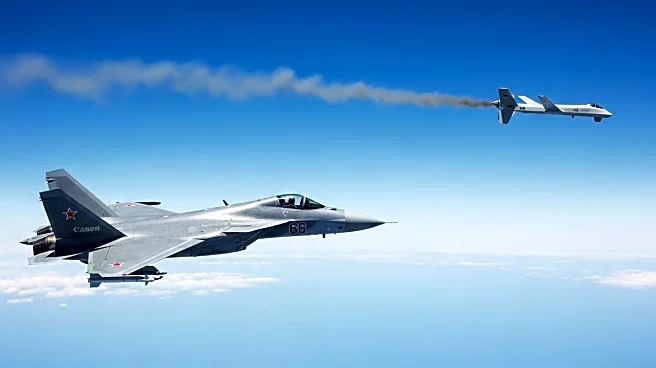What's Happening?
The Dutch Ministry of Defence has confirmed that a Royal Netherlands Air and Space Force F-35A fighter jet shot down a Russian unmanned aerial vehicle (UAV) over Poland. This engagement occurred under NATO's enhanced Air Policing mission, which aims to protect alliance airspace. The incident marks a significant development as it is the first known engagement of its kind over NATO territory. The Dutch F-35s are stationed in Poland from September to December to bolster the defense of NATO treaty areas. The Ministry of Defence released an image showing the F-35A with a drone kill marking, although the exact type of UAV shot down remains unspecified. The engagement likely took place during a mass incursion of over 20 Russian UAVs into Polish airspace on September 10.
Why It's Important?
This incident underscores the escalating tensions between NATO and Russia, particularly in Eastern Europe. The interception of a Russian drone by a NATO member highlights the alliance's commitment to defending its airspace and maintaining regional security. The presence of Dutch F-35s in Poland is a strategic move to deter potential threats and reassure member states of NATO's readiness to respond to provocations. The event may influence NATO's defense strategies, prompting discussions on enhancing airspace security and counter-drone measures. It also serves as a reminder of the complex geopolitical dynamics in the region, with potential implications for international relations and defense policies.
What's Next?
NATO and its member states may consider strengthening their air defense systems and counter-drone capabilities in response to this incident. Discussions on establishing a 'drone wall' to detect and neutralize UAV threats could gain momentum. The alliance might also increase its air policing missions and deploy additional resources to Eastern Europe. Political leaders and defense officials are likely to engage in diplomatic talks to address the security challenges posed by such incursions. The incident could lead to heightened military readiness and further collaboration among NATO members to ensure the protection of alliance airspace.
Beyond the Headlines
The interception of a Russian drone over Poland raises questions about the ethical and legal implications of using advanced military technology in airspace defense. It highlights the need for clear international regulations governing UAV operations and engagements. The incident may also influence public perception of NATO's role in regional security, potentially affecting political discourse and public policy. Long-term, this development could drive innovation in drone detection and neutralization technologies, shaping the future of military defense strategies.











